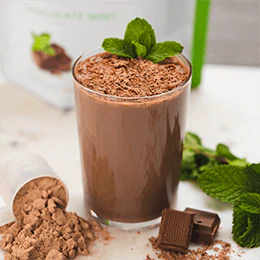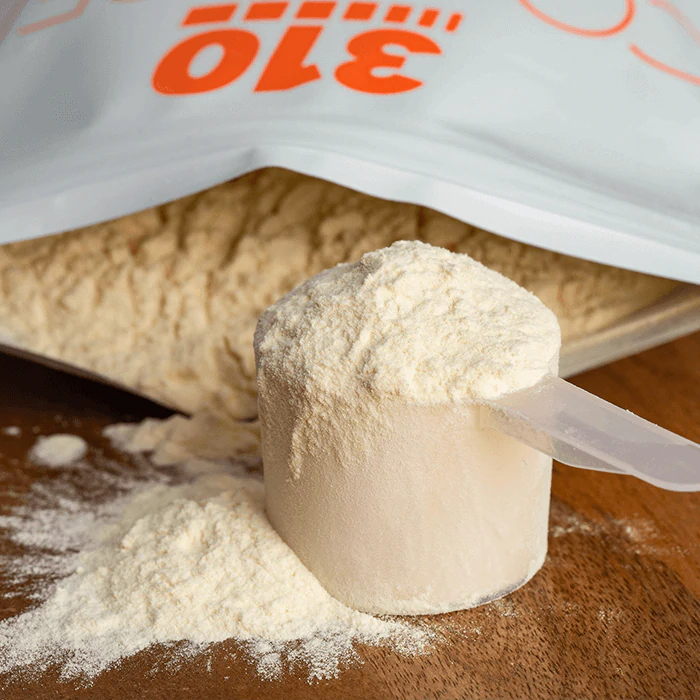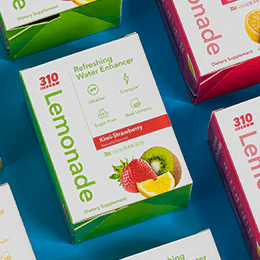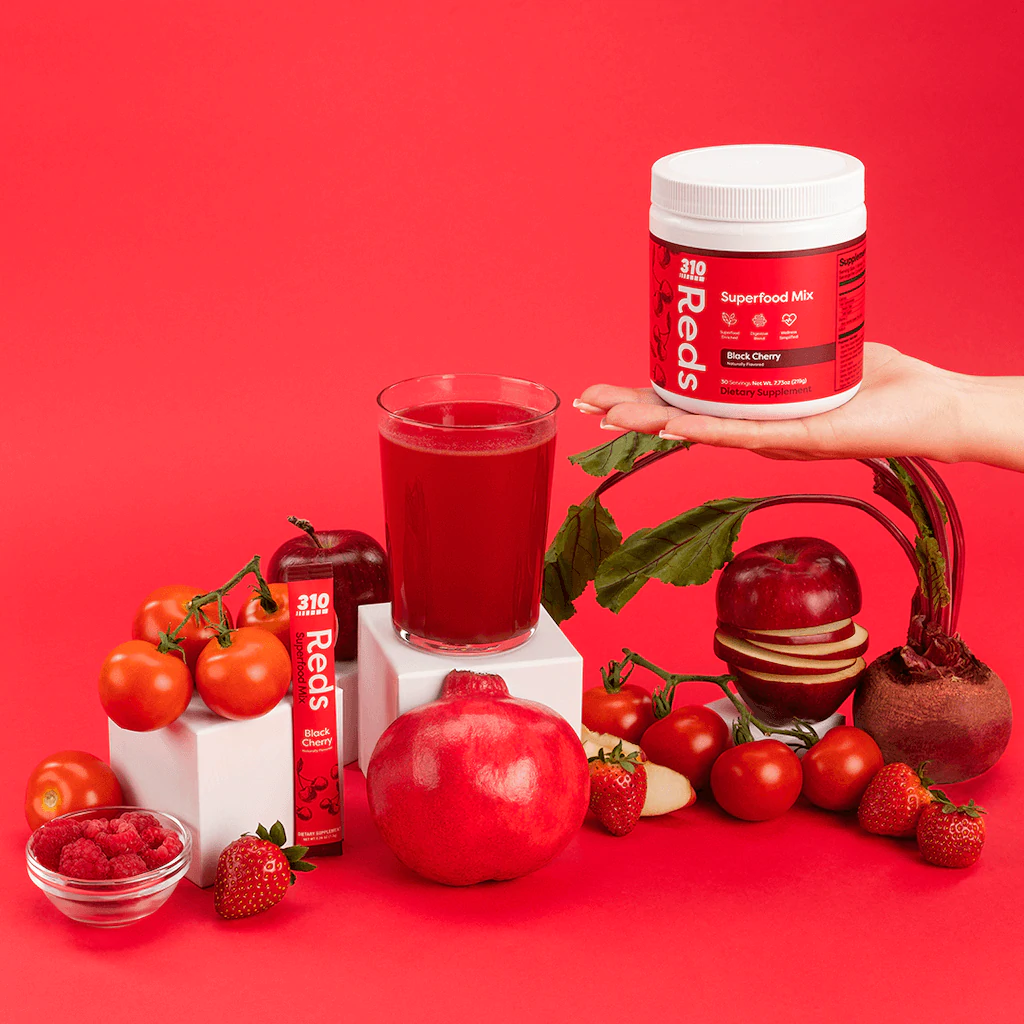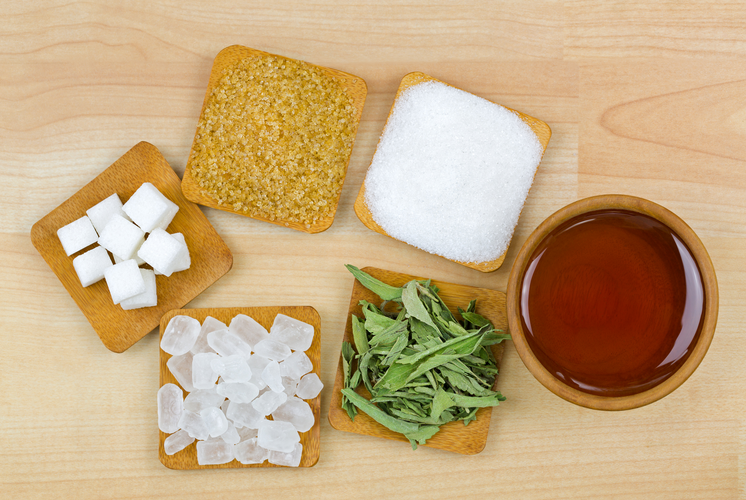When it comes to losing weight, there’s a lot of information out there about what you should and shouldn’t eat. And, there’s a lot of advertising on the packaging that might make something sound healthy when it actually isn’t.
One of those sneaky advertising terms that makes something sound healthier than it is?!
Sugar free!
Just because something says sugar-free, doesn’t mean it’s actually better for you. While sugar-free foods don’t have natural sucrose or sugar in them, that sugar is often replaced with other flavor enhancers such as artificial sweeteners. But, is an artificial sweetener healthier? Let’s find out.
Artificial vs. Natural Sweeteners

Let’s start off with some definitions.
Natural sweeteners are natural sugars are those that occur naturally in whole foods. Fructose, lactose, sucrose, and glucose are naturally occurring sugars in whole foods.
- Fructose = fruit sugars
- Lactose = milk sugars
- Sucrose = sugar
- Glucose = sugar from carbohydrates
Naturally occurring sugars are an important energy source for our body — within moderation. Generally, naturally occurring sugar is also consumed in conjunction with fiber, which slows down the absorption of sugar.
Artificial sweeteners are lab-created, chemical sugars that contain zero calories. Generally, these sweeteners are much sweeter than naturally occurring sugars. These sugars are often used in highly-processed foods and aren’t eaten in combination with fiber. Our bodies cannot use artificial sweeteners for energy like it can use sugar.
Artificial Sweeteners
It’s common for people on a restricted-calorie diet to reach for foods advertised as low sugar, low calorie, or low carb. But, it’s important to do a little detective work and find out what has been added to those foods to keep them tasting good. Usually, it’s an artificial sweetener.
Artificial sweeteners are lab-made and are much sweeter than natural sugar. As well, these sweeteners generally contain zero calories.
Common artificial sweeteners include:
- Aspartame (Equal)
- Saccharine (Sweet N’ Low)
- Sucralose (Splenda)
While they offer a zero-calorie, keto-friendly option, artificial sweeteners also have their health drawbacks. Artificial sweeteners may:
- Reduce healthy gut bacteria blood sugar regulation
- Be more addictive than natural sugar
- Increase sugar cravings
- Cause weight gain
- Increase risk for health side effects
Can Increase Sugar Cravings

Research has found that artificial sweeteners may be more addictive and might increase sugar cravings, which may lead you to eat more sugary or high-calorie foods.
Another concern with artificial sweeteners is how they affect our palate. Our sweet receptors build up a tolerance for sweetness over time. Meaning, artificial sweeteners, which are much sweeter than table sugar, can affect how much sweetness we like in our foods.
When we crave higher levels of sweetness, naturally-sweetened foods, such as fruit, become unsatisfying. And unsweet foods like vegetables don’t taste good at all. The result? You’re less likely to eat whole, nutritious foods and go for artificially-sweetened foods.
May Cause Weight Gain
One of the major concerns with artificial sweeteners is that they may cause our brains to disassociate sweetness with energy or calorie intake. This may cause increased cravings for sweets and an increase in caloric intake because we no longer associate sweets with calories.
Additionally, these no-calorie sweeteners may not activate the food reward pathway, leaving us feeling unsatisfied. When we continue to feel hungry, we may continue to eat, which could also lead to a higher calorie intake. All of this may lead to weight gain.
Sugar
When it comes to natural sugar, you can follow the old adage: everything in moderation. A little bit of sugar isn’t unhealthy. The real problem with modern diets is added sugar. Many processed foods add sugar to improve flavor and act as a natural preservative. This added sugar means we’re consuming much higher than normal levels of sugar.
When it comes to sugar, you want to consume in moderation while eating whole foods. These foods generally contain fiber, which helps your body to slowly process the sugar and limits blood sugar spikes.
Regularly consuming too much sugar can lead to serious health problems with your heart, chronic inflammation, raised blood pressure, and weight gain.
Moderation is key.
The American Heart Association recommends a daily intake of 36 grams of sugar for men and 25 grams of sugar for women. As you start reading nutrition labels, you’ll realize this is not very much sugar at all. For example, a 12-ounce can of soda contains 32 grams of sugar, which would be your whole daily allotment in one can.
Plant-Derived Natural Sweeteners

An alternative to sugar and artificial sweeteners are plant-derived, low-calorie sweeteners. These sweeteners come from plants and are more natural than artificial, lab-created sweeteners.
Plant-derived sweeteners include:
- Stevia
- Erythritol
- Xylitol
- Monk fruit extract
So far, research shows that these plant-derived sweeteners are safe and healthier than artificial sweeteners.
While plant-derived sweeteners are low-calorie, they should still be consumed in moderation. And, it’s important to look at the ingredients on the nutrition label as some of these sweeteners include additives, such as maltodextrin, which has been linked to blood sugar spikes.
The most well-researched plant-derived sweetener is Stevia, which has been found to have no effect on blood pressure or blood sugar and is therefore safe for those with diabetes. This is also helpful to reduce blood sugar spikes in people without diabetes.
If you’re looking to reduce your sugar intake and want a sugar alternative, it’s important to choose one of the plant-derived sweeteners. And, be sure to read the nutrition label and pick one that is pure and isn’t blended with other chemicals.
Which Sweetener to Choose?
When it comes to choosing the right sweetener, you have to choose the right one for you. No matter which sweetener you choose, it should be consumed in moderation. Just because sugar is natural or a sweetener is plant-derived doesn’t mean it’s healthy, but it can be a part of a healthy, well-balanced diet.
Many people choose sugar or plant-derived sweeteners over artificial sweeteners because they want to consume foods that are natural, not lab grown. As well, sugar and plant-derived sweeteners have been shown to have fewer health consequences when eaten in moderation than artificial sweeteners.
Once you know what sweetener is right for you, it’s important to start learning how to read nutrition labels to understand how many grams of sugar are contained in a serving of that food and to read the ingredients list to see which type of sweetener was used. Be a discerning shopper and read the back of the packaging, not just the “sugar-free” label on the front.
So, What’s The Take-Away Message?
Choosing the right foods to support your health goals and make you feel good can be complicated. Especially when the packaging and marketing try to lead you astray with labels like “sugar free.” While a food may not contain sugar, that doesn’t make it healthy. Learning to read the label and being armed with knowledge will help you to make the right decision in smart choices to support your health goals.



